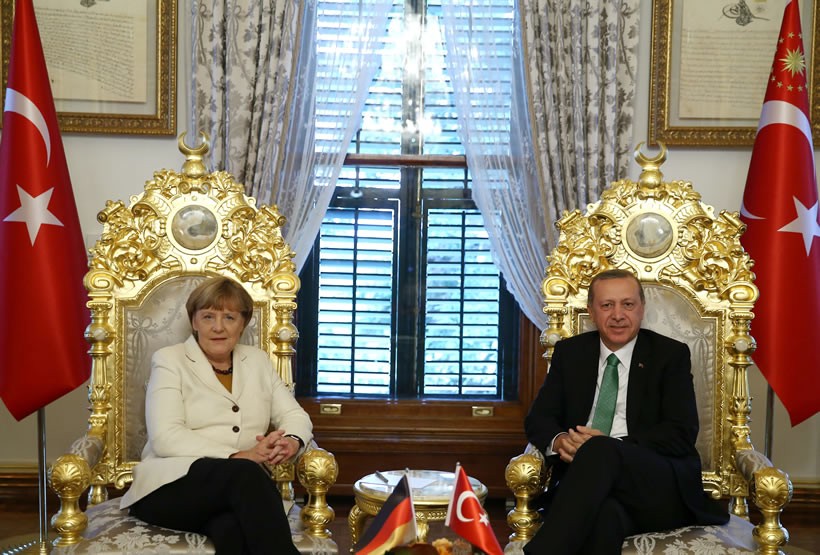Merkel defends 'golden throne' picture with Erdogan in her new book

Former German Chancellor Angela Merkel said in her new book, Freedom, that she had to engage Turkey to negotiate a controversial migration deal in 2016 to stop the flow of refugees into Europe, despite facing intense criticism from the European public.
Merkel states it would have been an illusion to avoid engaging Turkish President Recep Erdogan on the Syrian crisis, even though she also writes in the book that she always believed opening European Union accession talks with Turkey was a mistake.
In the book, Merkel recounts the events leading up to a high-level meeting with Erdogan in October 2015 in Istanbul, which was fiercely criticised by the German public for its optics, especially due to the golden seats.
"My trip to Istanbul was harshly criticised, not least because of two chairs—or golden thrones, to be precise," she wrote.
"Erdogan sat on one, and I sat on the other. We didn’t just sit on them for the photocall but for the entire duration of our conversation. All I thought was: Wow, look at these!" she added.
New MEE newsletter: Jerusalem Dispatch
Sign up to get the latest insights and analysis on Israel-Palestine, alongside Turkey Unpacked and other MEE newsletters
'When we agreed on things, he was very amiable and called me his 'dear friend''
-Angela Merkel
"I was later accused of kowtowing to Erdogan like an emperor in his palace, and it was suggested that I would throw myself onto the ground before him just to secure an agreement with Turkey to keep further refugees away.
"To make matters worse, as the visit was held two weeks before the parliamentary elections in Turkey, I was also accused of aiding Erdogan’s Justice and Development Party (AKP) election campaign."
Merkel says such criticism was "unfair and, in part, untrue," explaining that both the right and the left in Germany were pressuring her to do everything in her power to reduce the number of refugees arriving in Europe, while simultaneously criticising her for negotiating with "the autocrats" in Ankara so close to the elections.
"That was ridiculous," she stated. "One look at the map and the realities in the Aegean was enough to see that it would only be possible to organise and manage developments in collaboration with Turkey, and that that needed to be done as a matter of urgency. Everything else was an illusion, and I didn’t entertain illusions."
He called me his 'dear friend'
Merkel added that she had to negotiate with Erdogan because Turkey was the main transit country for many refugees arriving via the Balkan route.
"That was why I negotiated with the Turkish president and, in doing so, experienced Erdogan as a politician who could act across the full political spectrum, not just in terms of refugee policy," she wrote in her book. "When we agreed on things, he was very amiable and called me his 'dear friend.' When we had differences of opinion, he used every opportunity to counter-argue at great length, which sometimes meant discussions became protracted."
Merkel says she likens Erdogan’s behaviour to that of leaders with autocratic tendencies.
"Incidentally, I have observed that a typical characteristic of politicians with autocratic tendencies is that they have unlimited time when they need it. In such cases, simultaneous interpreting is simply replaced with consecutive interpreting," she said.
Merkel continued her negotiations through telephone calls with then-Turkish Prime Minister Ahmet Davutoglu, whom she describes as "a cosmopolitan, knowledgeable man with an education in history, who spoke perfect English and a bit of German."
Turkey and the EU eventually struck a deal in 2016 based on Davutoglu’s proposal, which became known as the one-to-one mechanism: every migrant illegally arriving on the Greek islands would be sent back to Turkey on the basis of a Greece–Turkey readmission agreement. In return, for every Syrian being returned to Turkey from the Greek islands, another Syrian would be resettled from Turkey directly to the European Union.
"That was a bold, pioneering proposal, which was intended not only to prevent illegal migration through border protection measures but also to enable legal migration," Merkel adds.
Along with €3 billion ($3.14 billion) agreed to be paid to Turkey in 2015 for building schools for Syrian refugee children and implementing other measures, the EU also promised to make a further €3 billion available to Turkey by the end of 2018. The EU additionally pledged to extend visa liberalisation for Turkey, provided certain requirements were met, and to open further chapters in the EU accession process.
"Subsequently, the number of refugees coming to Northern Europe and therefore also arriving in Germany via the Balkan route dropped considerably - down 95 percent from October 2015," she adds.
However, Turkey suspended the readmission deal in 2018, citing tensions with Greece over the Aegean Sea and the presence of Turkish soldiers in Greece who had been accused of participating in a coup attempt in Turkey.
Middle East Eye delivers independent and unrivalled coverage and analysis of the Middle East, North Africa and beyond. To learn more about republishing this content and the associated fees, please fill out this form. More about MEE can be found here.

